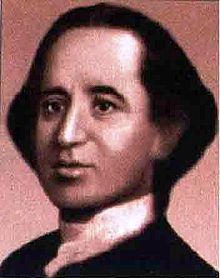Emin the Armenian
| Joseph Emin Յովսէփ Էմին |
|
|---|---|

A young Emin in Calcutta
|
|
| Born | 1726, August 2 Hamadan, Iran |
| Died | August 2, 1809 (aged 83) Calcutta, India |
| Resting place | Calcutta, India |
| Nationality | Armenian |
| Other names | Hoseph |
| Known for | Armenian national liberation movement, Prominent figure |
| Spouse(s) | Thangoom-Khatoon Emin |
| Children | Arshak, Joseph |
| Parent(s) | Joseph, (Mother's name unknown) |
Joseph Emin (Armenian: Յովսէփ Էմին, Hovsep Emin) (August 2, 1726 - August 2, 1809, Calcutta), was a prominent figure of the Armenian national liberation movement who travelled to various European countries and Russia in order to secure support for the liberation of Armenia from Persia and the Ottoman Empire. He married Thangoom-Khatoon (1748 - 14 September 1843) in 1776, whose grave lies next to his.
Emin was Born in Hamadan, Persia, in 1726 at a time when the empire was in turmoil, following the Afghan occupation of Isfahan and the fall of the Safavids. As a child Emin had witnessed firsthand the troubles of his family and other Christians at the hands of local Muslim officials. In 1744 Emin moved to India to join his merchant father in Calcutta. As a young man, not unlike Israel Ori before him, Emin resolved to dedicate his life to the liberation of Armenia. When he came into contact with the British military in Calcutta, he realized that the Armenians needed both education and skill in the contemporary Western art of warfare if they hoped to regain independence.
In 1751, against his father's wishes Emin left for London. His first four years there were filled with misery and hard labour, and he was deprived of any financial assistance from his father. However, in 1755 Emin experienced a turning point in his life. He met and befriended Edmund Burke, the future British statesman and political writer, with whose support he gained access to the circles of British intellectuals and nobility. He received sponsorship from Hugh Percy the Duke of Northumberland and was admitted to the Royal Military Academy in Woolwich, where he remained for thirteenth months after which he enlisted as a volunteer in the British and Prussian armies during their war against France in order to gain practical experience.
...
Wikipedia
